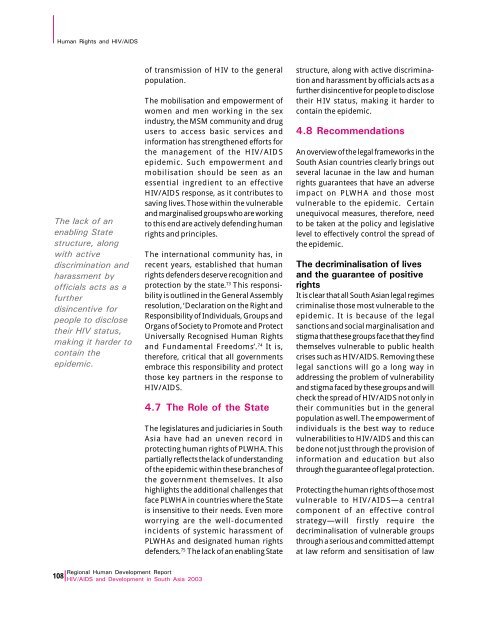Download Report - UNDP Asia-Pacific Regional Centre - United ...
Download Report - UNDP Asia-Pacific Regional Centre - United ...
Download Report - UNDP Asia-Pacific Regional Centre - United ...
You also want an ePaper? Increase the reach of your titles
YUMPU automatically turns print PDFs into web optimized ePapers that Google loves.
Human Rights and HIV/AIDSThe lack of anenabling Statestructure, alongwith activediscrimination andharassment byofficials acts as afurtherdisincentive forpeople to disclosetheir HIV status,making it harder tocontain theepidemic.of transmission of HIV to the generalpopulation.The mobilisation and empowerment ofwomen and men working in the sexindustry, the MSM community and drugusers to access basic services andinformation has strengthened efforts forthe management of the HIV/AIDSepidemic. Such empowerment andmobilisation should be seen as anessential ingredient to an effectiveHIV/AIDS response, as it contributes tosaving lives. Those within the vulnerableand marginalised groups who are workingto this end are actively defending humanrights and principles.The international community has, inrecent years, established that humanrights defenders deserve recognition andprotection by the state. 73 This responsibilityis outlined in the General Assemblyresolution, ‘Declaration on the Right andResponsibility of Individuals, Groups andOrgans of Society to Promote and ProtectUniversally Recognised Human Rightsand Fundamental Freedoms’. 74 It is,therefore, critical that all governmentsembrace this responsibility and protectthose key partners in the response toHIV/AIDS.4.7 The Role of the StateThe legislatures and judiciaries in South<strong>Asia</strong> have had an uneven record inprotecting human rights of PLWHA. Thispartially reflects the lack of understandingof the epidemic within these branches ofthe government themselves. It alsohighlights the additional challenges thatface PLWHA in countries where the Stateis insensitive to their needs. Even moreworrying are the well-documentedincidents of systemic harassment ofPLWHAs and designated human rightsdefenders. 75 The lack of an enabling Statestructure, along with active discriminationand harassment by officials acts as afurther disincentive for people to disclosetheir HIV status, making it harder tocontain the epidemic.4.8 RecommendationsAn overview of the legal frameworks in theSouth <strong>Asia</strong>n countries clearly brings outseveral lacunae in the law and humanrights guarantees that have an adverseimpact on PLWHA and those mostvulnerable to the epidemic. Certainunequivocal measures, therefore, needto be taken at the policy and legislativelevel to effectively control the spread ofthe epidemic.The decriminalisation of livesand the guarantee of positiverightsIt is clear that all South <strong>Asia</strong>n legal regimescriminalise those most vulnerable to theepidemic. It is because of the legalsanctions and social marginalisation andstigma that these groups face that they findthemselves vulnerable to public healthcrises such as HIV/AIDS. Removing theselegal sanctions will go a long way inaddressing the problem of vulnerabilityand stigma faced by these groups and willcheck the spread of HIV/AIDS not only intheir communities but in the generalpopulation as well. The empowerment ofindividuals is the best way to reducevulnerabilities to HIV/AIDS and this canbe done not just through the provision ofinformation and education but alsothrough the guarantee of legal protection.Protecting the human rights of those mostvulnerable to HIV/AIDS—a centralcomponent of an effective controlstrategy—will firstly require thedecriminalisation of vulnerable groupsthrough a serious and committed attemptat law reform and sensitisation of law<strong>Regional</strong> Human Development <strong>Report</strong>108 HIV/AIDS and Development in South <strong>Asia</strong> 2003
















